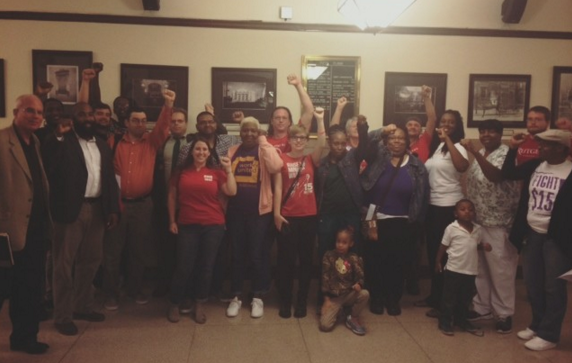California workers are the most recent to win a major victory in the movement for a $15 minimum wage. Only days after labor, community groups and low-wage workers qualified a statewide ballot initiative for $15/hour by 2021, Governor Jerry Brown counter-proposed raising the wage to $15 by 2023. “If anyone tells you radical change isn’t possible, and to settle for incremental change instead,” writes US Uncut, “tell them to look at what the Fight for 15 movement has accomplished.”
RT #15Now on CA victory: https://t.co/buICME2oK1 Working ppl challenge politics as usual to win #FightFor15 @15NowMN pic.twitter.com/oA5cfiU4wM
— 15 Now (@FifteenNow) March 28, 2016
In Seattle, Tacoma, Oregon and now California, low-wage workers and supporters used a ballot initiative to force $15 onto the agenda. In each case, big business and their allies saw the writing on the wall. Independent political action has been a key component to every concrete victory for $15 to this date, including strikes, mass demonstrations, and political challenges through ballot initiatives, to clearly expose the interests of big business against the interests of working class communities. Faced with a strong workers movement, politicians who previously ignored $15/hour came under pressure to side with workers’ demands.
In Minneapolis, 15 Now Minnesota is launching a ballot initiative for a $15/hour minimum wage. Despite thousands of workers and supporters organizing for $15 as a concrete step to deal with Minnesota’s worst in the nation racial and economic disparities, city officials haven’t acted to solve the crisis of poverty pay facing over 100,000 workers, mainly women and workers of color. Winning $15 in Minneapolis will take a mass movement of workers building pressure from below, ready to take $15 to the ballot and turn the passive 82% support for $15 in Minneapolis (shown by a recent poll) into active organizing to win.
Earlier this month, Oregon workers won a tremendous victory when Governor Kate Brown signed a statewide minimum wage increase, raising Portland workers to $15 by 2022. While Oregon workers and $15 supporters continue the fight against state government pre-emption on municipal legislation to deal with workers’ rights issues, the statewide increase would not have happened without a strong ground campaign fighting to get $15/hour on the Oregon ballot.
The movement for $15 should be very clear: even when politicians cut across worker organizing to reach consensus with business, these victories are a result of the strength of grassroots organizing by low-wage workers, labor unions and supporters.
Working class communities are winning by organizing independently. Our movement has shifted the national debate. Even Presidential candidate Bernie Sanders, who didn’t initially support the call for a $15 minimum wage, has shifted under pressure from worker organizing, to raise the demand for $15 as part of his call to build a “political revolution against the billionaire class”.
When status quo politicians don’t clearly stand on the side of working people, we’ve proven our movement can assert itself by mounting a political challenge, through a ballot initiative or by running our own candidates who will firmly represent the interests of working people.

